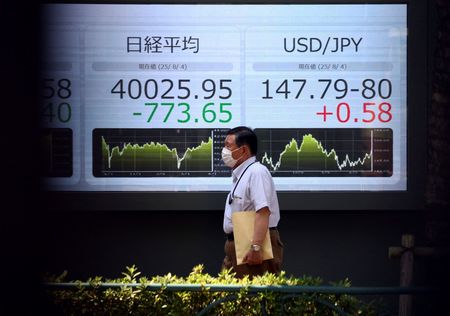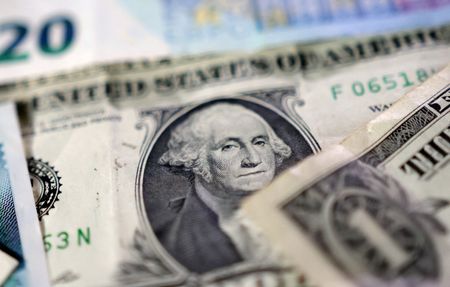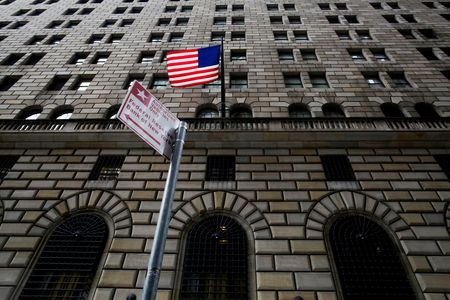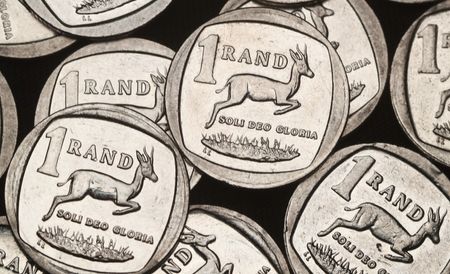By Dhara Ranasinghe
LONDON (Reuters) -Long-dated U.S. Treasuries and stock futures slipped on Tuesday after President Donald Trump said he was firing a Federal Reserve governor, an unprecedented move that fuelled investor concerns about the Fed’s independence.
French stocks and bonds also tumbled as France’s minority government looked increasingly likely to be ousted next month, raising the spectre of renewed political instability in one of the euro zone’s biggest economies.
World stocks edged off this month’s record highs, with focus on U.S. markets after Trump said he was removing Lisa Cook from the Fed’s board of directors, citing alleged improprieties in obtaining mortgage loans. Cook said through her lawyers that Trump’s “demands lack any proper process, basis or legal authority”.
Gold prices touched a two-week high, U.S. equity futures fell and the dollar was on the back foot, as Trump also renewed tariff threats on trade partners.
Japan’s Nikkei closed down almost 1% and Europe’s broad STOXX 600 index was last down 0.6% as the U.S. president’s latest salvo on the Fed muddied the outlook for Fed policy.
“Since he took office, Trump has managed to get his way on most things he has turned his attention to,” said RBC BlueBay Asset Management Chief Investment Officer Mark Dowding.
“In this context, it may seem reasonable for markets to conclude that he may end up getting his way with the Federal Reserve.”
In London trade, the benchmark U.S. 10-year Treasury yield rose 2.5 basis points to 4.30%, while 30-year bond yields rose 4 bps to 4.94%.
The two-year Treasury yield, which typically moves in step with interest rate expectations for the Fed, fell 2 bps to 3.71% as investors continue to anticipate lower rates.
Trump has regularly threatened to dismiss Fed Chair Jerome Powell, and earlier this month he fired a top Labor Department official after accusing her, without evidence, of manipulating jobs data that had disappointed him.
Trump, who lacks the legal authority to fire the Fed chair except “for cause”, has backed away from that threat as Powell gets closer to the expiration of his term next May.
Cook’s exit from the Fed could speed up the president’s reshaping of the rate-setting Federal Open Market Committee. Her term had been due to end in 2038.
Extending months of turmoil over on-again, off-again tariff policies, Trump also threatened “subsequent additional” import duties on countries with digital taxes.
NVIDIA EARNINGS
In currency markets, the euro rose around 0.2% to $1.1642. The dollar was also a touch softer at 147.60 yen.
That all left the dollar index, which tracks the greenback against a basket of currencies, 0.2% softer after a 0.7% gain on Monday.
Tim Graf, head of macro strategy for EMEA, State Street, said he remained bearish on the outlook for the dollar.
“We’ve started to see a lot of selling of the dollar from institutional investors again,” he said. “They are willing to build overweights in euros.”
Friday’s U.S. personal consumption prices reading, considered the Fed’s preferred inflation gauge, could provide the next steer on the rate outlook, while in stock markets Nvidia earnings on Wednesday were also moving into focus.
“Nvidia earnings matter, it will give us insight into the AI space, as well as what’s happening at the current poster-child for the tech sector,” said Guy Miller, chief market strategist at Zurich Insurance Group.
“It will be interesting to see what guidance is given.”
FRANCE WOES
In Europe, French bonds and stocks tumbled, particularly banking shares, as the minority government looked increasingly likely to be ousted next month.
Main opposition parties said they would not back the government in a September 8 confidence vote called by Prime Minister Francois Bayrou over his plans for sweeping budget cuts.
France’s blue chip CAC40 index was last down 1.5% with banking giants BNP Paribas and Societe Generale bearing the brunt of selling.
France’s 10-year government bond yield rose to 3.53%, its highest since March. When a bond’s yield rises, its price falls.
“We are heading into budget season which is why this (French selloff) is happening,” State Street’s Graff said.
Elsewhere, oil prices fell after surging nearly 2% in the previous session as traders monitor developments surrounding the war in Ukraine and potential disruption to Russian fuel supplies.
Brent crude oil weakened 1.5% to $67.78 a barrel and U.S. crude fell 1.7% to $63.71.
(Reporting by Dhara Ranasinghe; Additional reporting by Rocky Swift and Kevin Buckland in Toykol; Editing by Helen Popper and Alison Williams)











